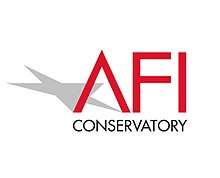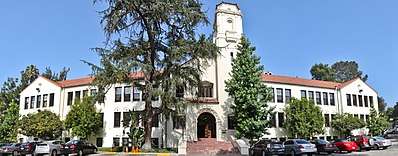AFI Conservatory
The AFI Conservatory is a private not-for-profit graduate film school in the Hollywood Hills district of Los Angeles. Students (called "Fellows") learn from the masters in a collaborative, hands-on production environment with an emphasis on storytelling. The Conservatory is a program of the American Film Institute founded in 1969.
 | |
| Type | Private not-for-profit school |
|---|---|
| Established | 1969 |
| Affiliation | American Film Institute |
| Dean | Susan Ruskin |
| Location | Hollywood Hills, Los Angeles , California , USA |
| Campus | Urban, 8 acres (3.2 ha) |
| Website | afi |
History
The Center for Advanced Film Studies (later the AFI Conservatory) opened its doors at Greystone Mansion on September 23, 1969. Harold Lloyd screened his film The Freshman and spoke with AFI Fellows on the school's very first day. The first class included Terrence Malick, Caleb Deschanel and Paul Schrader.
In 1973 filmmaker John Cassavetes was the first filmmaker-in-residence while editing A Woman Under The Influence. Although we didn't see much of him we knew he was there. In 1975, filmmaker Ján Kadár, director of the Oscar-winning film The Shop on Main Street, became the Conservatory's second filmmaker-in-residence.
In 2013, Emmy and Oscar-winning director, producer and screenwriter James L. Brooks (As Good as It Gets, Broadcast News, Terms of Endearment) joined the AFI Conservatory as Artistic Director, where he provides leadership for the film program. Brooks' artistic role at the AFI Conservatory has a rich legacy that includes Daniel Petrie, Jr., Robert Wise and Frank Pierson. Award-winning director Robert Mandel served as Dean of the AFI Conservatory for nine years. Jan Schuette took over as Dean in 2014 and served until 2017. Film Producer Richard Gladstein became Dean in May 2017. Michael Chung & Tom Engfer became Co-Interim Deans in November 2018.
Among those AFI has bestowed Honorary Degrees upon during its annual Commencement ceremony are Maya Angelou, John Williams, Ken Burns, Sherry Lansing, Sydney Pollack, Clint Eastwood, Jeffrey Katzenberg, Kathleen Kennedy, Spike Lee, Rita Moreno and Quentin Tarantino.
Thirteen AFI Conservatory thesis films have been nominated for Academy Awards.
Academics

Rankings
In 2011, The Hollywood Reporter ranked it the #1 film school in the world.[1]
It is ranked in the top five graduate film programs along with USC, UCLA, NYU and California Institute of the Arts by the Princeton Review and US News and World Report[2]
Conservatory Program
AFI Conservatory is a five-term Master of Fine Arts program in six disciplines: Cinematography, Directing, Editing, Producing, Production Design, and Screenwriting. Traditionally, the Conservatory accepts 28 Fellows per year for most disciplines and 14 for the Production Design and Editing disciplines. Each discipline's program runs two years in length.
First Year - Fellows from all disciplines work on at least three digital video or high definition short films (up to 20 minutes), referred to as 'cycle projects'. Each of these first-year projects are accomplished by Fellows with a minimum of oversight from the senior faculty. The purported goal being to stimulate a flexible and creative approach to filmmaking within imposed budgetary constraints and without the crutch of seasoned oversight. These 'cycle projects' make up the core curriculum of the first year experience and amount to a 'boot camp" of filmmaking that simultaneously challenges and invigorates the Fellows involved.
Second Year - Most Fellows work on at least one thesis short film, shot on digital video, high definition, 35mm film, or 16mm film, and develop portfolio materials (such as a reel and a feature film screenplay). Screenwriting Fellows have the option of writing two feature-length screenplays instead of participating in a thesis film. They are responsible for raising the bulk of their own financing for these projects (average budget is $30,000), and must adhere to standard industry regulations, such as SAG charter rules, during filming. The senior faculty of the conservatory oversee the development of the 'second year' projects and monitor their development in a manner similar to what might be expected of an Executive Producer.[3]
Disciplines

Cinematography - Encompassing training from pre-visualization to advanced image manipulation and control, Cinematography Fellows develop their storytelling skills using formats ranging from digital video to 16mm and 35mm film cameras to the most cutting-edge cameras on the market.
Directing - With a focus on narrative filmmaking, Directing Fellows learn diverse directing styles, techniques and strategies as they gain a thorough understanding of the production process, script to screen.
Editing - Editing Fellows master the skills to be editors, assistant editors and post-production producers while learning the technical, aesthetic and collaborative aspects of post-production with a primary focus on storytelling.
Producing - Producing Fellows study all aspects of creative, entrepreneurial production while developing and producing a minimum of three short films in their first year and a thesis film in their second year.
Production Design - Attracting artists from architecture, interior design, theater design and other related fields, the Production Design curriculum focuses on the creative process of visually and physically developing cinematic environments.
Screenwriting - Screenwriting Fellows conceive and write multiple projects in features, short films, long and short-form TV drama and comedy as well as webisodes and other Internet innovations. Fellows learn to collaborate with Directing and Producing classmates to bring their stories to the screen.
Faculty
The AFI Conservatory has an esteemed faculty of working professionals including Todd Cherniawsky (art director, Star Wars: The Last Jedi), Stan Chervin (writer, Moneyball), Destin Daniel Cretton, (director, Short Term 12), David Cook, (editor NCIS), Matthew Friedman (editor, The Farewell), Joe Garrity (production designer, Best in Show), Michael Jablow (editor, Old School), Susan Littenberg (editor Easy A), Stephen Lighthill (recipient 2018 ASC President's Award), Elvis Mitchell (film critic), Michele Mulroney (writer, Sherlock Holmes: A Game of Shadows), Martin Nicholson (editor, The Alienist), Lauren Polizzi (art director, The Hunger Games: Mockingjay – Part 1 & The Hunger Games: Mockingjay – Part 2), Louis Provost (VP Production, Walt Disney Studios), Patricia Riggen (director The 33), Russell Schwartz (marketing executive on films including Chappaquiddick), Anna Thomas (co-writer El Norte), Jennie Tugend, (producer, Free Willy), Janet Yang (producer, The Joy Luck Club).
Seminars
The Harold Lloyd Master Seminar series — named after silent film legend Harold Lloyd, who gave the first seminar in 1969 — takes place on campus throughout during the academic year and brings AFI Conservatory Fellows together with artists to share their work and experiences in an informal and accessible setting.
Robert Altman, Darren Aronofsky, Lucille Ball, Peter Bogdanovich, Mel Brooks, Jerry Bruckheimer, James Cameron, Anne Coates, Sofia Coppola, Bette Davis, Guillermo del Toro, Clint Eastwood, Nora Ephron, Todd Field, Jane Fonda, William Friedkin, Tom Hanks, Howard Hawks, Edith Head, Amy Heckerling Alfred Hitchcock, John Huston, Alejandro G. Inarritu, Barry Jenkins, David Lynch, Patty Jenkins, Ryan Murphy, Christopher Nolan, Al Pacino, Jordan Peele, Sidney Poitier, John Singleton, Steven Soderbergh and Steven Spielberg.
Alumni
Main article: AFI Conservatory alumni
The program has graduated more than 5,000 Fellows. AFI Conservatory alumni include:
- Andrea Arnold, (American Honey, Fish Tank, Big Little Lies),
- Darren Aronofsky (Requiem for a Dream, Black Swan, mother!),
- Julie Dash (Daughters of the Dust),
- Sam Esmail (Mr. Robot),
- Todd Field (In the Bedroom, Little Children),
- Jack Fisk (Badlands, Days of Heaven, There Will Be Blood),
- Scott Frank, (Out of Sight, Logan),
- Carl Franklin (One False Move, Devil in a Blue Dress, House of Cards),
- Liz Hannah (The Post),
- Amy Heckerling (Clueless, Fast Times at Ridgemont High),
- Patty Jenkins (Monster, Wonder Woman),
- Janusz Kamiński (Lincoln, Schindler's List, Saving Private Ryan),
- Matthew Libatique (Noah, Black Swan),
- David Lynch (Mulholland Drive, Blue Velvet),
- Terrence Malick (Days of Heaven, The Thin Red Line, The Tree of Life),
- Rachel Morrison (Mudbound, Black Panther),
- Victor Nuñez (Ruby in Paradise, Ulee's Gold),
- Wally Pfister (Memento, The Dark Knight, Inception),
- Robert Richardson (Platoon, JFK, Django Unchained),
- Ari Aster (Hereditary, Midsommar),
and many other filmmakers.
Awards
AFI Conservatory alumni have received a total of 149 Academy Award nominations and 30 wins.
References
- "AFI Conservatory Ranked #1 Film School in the World by The Hollywood Reporter". www.prnewswire.com.
- "Top Film School Ranking". Good University Ranking Guide.
- "American Film Institute Conservatory". AFI.